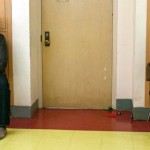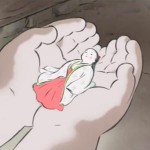If time really is money, then the Justin Timberlake vehicle “In Time” is an Occupy Wall Street manifesto costumed for Halloween as a Bonnie and Clyde type thriller. Like the Occupy movement, it packs a lot of punch and a lot of passion, but doesn’t have an underlying rationality.
In a vaguely futuristic, dystopian world, time has replaced money as currency. People have been genetically coded to stop aging at 25. They retain their youthful looks, but their internal clock starts ticking. This is a literal clock, glowing on their arms, constantly ticking down the moment until their death. At 25, they are issued one year. They may work to earn more time, they must pay for living expenses with time. A cup of coffee costs four minutes, rent might cost a few days.
Justin Timberlake plays Will Salas, who lives in the ghetto with his mother (the youthful Olivia Wilde), who is celebrating her 50th birthday, or as they call it, 25 for 25. Being poor, they live on very thin margins. If they’re flush, they may have a day in reserve. Sometimes, they can be down to hours and minutes. They live with urgency, knowing a late bus or missed work shift might end their life.
The rich may walk around with a century or millennium on their arms, and more in the bank. They spend decades on fancy food and fast cars, knowing they have all the time in the world. Literally.
Suddenly wealthy through a gift, Will meets an ennui-ridden heiress (Amanda Seyfried) named Sylvia. When the police, called “time keepers,” track Will down believing he stole the time, he has little choice but to abduct Sylvia and embark with her on a Bonnie and Clyde spree of sticking it to the well-endowed.
The film is generally gripping, best when Timberlake and Seyfried are running from the law, fighting gangsters (cleverly named minute men), or committing acts of Robin Hood-esque thievery. However, at other times it plays as if the makers were too enamored with the concept to give the script a thorough going-over. The dialog is painfully clumsy at times, characters one dimensional, and the story full of holes. A storyline about Will picking up the mantle of his dead father is hinted at, but never brought to fruition. Rated PG-13, the film has some on-screen sexuality, violence, and brief strong language.
The concept is at least fresh. The idea of time literally being money brings urgency to economic theory. In this world, if your boss cheats you or prices rise dramatically, it could literally kill you.
In this world, there is “plenty of time to go around,” as one character says, but it is all controlled by the few. In other words, infinite time is made into a finite resource. Time (as a stand in for money) exists as a limited quantity and is in control of a few wealthy people.
Sound familiar?
They intentionally keep the poor in ghettos, with guarded gates, and force them to work in dismal factories. When the masses become too numerous or uppity, the wealthy arbitrarily raise prices, intentionally killing off the poorest of the poor.
Sound familiar now?
“For a few to be immortal, many must die,” the wealthy repeatedly intone, but don’t explain why. The rich don’t do things like harvest organs or feed of others’ energy or even need resources the poor take. They simply hog time to themselves. The poor do not serve a purpose, nor do they actually use resources up that are supposedly infinite.
The wealthy hate them simply because they are poor.
As a metaphor for wealth, the concept completely breaks down. It reflects the socialist or even communist notion that wealth is at a fixed level, a constant pie that must be sliced into pieces, but is controlled by a small segment of the population.
We understand wealth to be quite different, dynamic, ever expanding. In the movie, there is nothing a poor man can do to create time. He cannot plant seconds and reap years. He cannot scrimp and save to buy his own time factory. He cannot invent an iTime pod that becomes the hip gadget to have, making him fantastically wealthy. The poor simply scurry frantically from job to job, desperately seeking to add minutes to their sorry lives.
In the real world, in a healthy capitalistic market, a man or woman can create wealth by the sweat of their brow or the fruit of their mind. A field planted and harvested creates a crop that was not existent before, new wealth added to the pie. An idea conceived, nurtured, and acted upon can create a company that not only distributes wealth to its creator, but jobs to thousands.
When the unfortunate finally stick it to the man in the end, the conclusion feels as open ended and confusing as an Occupy Wall Street rally. At least the real-life protesters now have something to see when they need a break from their drum circles. We’ll just ignore that by doing so, they’re putting money in the pocket of 20th Century Fox and the theater chains.













